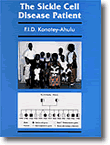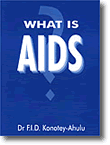Author :
Who is Dr. Konotey-Ahulu?
Dr. Felix I.D. Konotey-Ahulu is a Ghanaian physician. He trained at London University's Westminster Hospital School of Medicine, qualifying MB, BS in May 1959 and obtaining his Doctorate in Medicine degree in February 1972. He was Consultant Physician at the Korle Bu Teaching Hospital and Director of the Ghana Institute of Clinical Genetics. A Fellow of the Ghana Academy of Arts and Sciences (FGA) he won the Academy's Gold Medal in 1974 for the "most outstanding contribution to knowledge in the Medical Sciences by a Ghanaian between 1952 and 1973". He served as a member of the WHO Expert Advisory Panel on Human Genetics (1976-1981).
One of the recipients in Philadelphia in 1972 of the "Dr. Martin Luther King Jr. Foundation Award for outstanding research in Sickle Cell Anaemia" he was also one of those who in 1976 obtained the Guinness Award for Scientific Achievement (GASA) "in the Commonwealth" in recognition of their work in applying science to the service of the community". He was Visiting Professor/Honorary Consultant to Howard University's Centre for Sickle Cell Disease, Washington DC, USA. He won the 1998 Third World Academy of Sciences (TWAS) Award in the Basic Medical Sciences, part of whose Citation read "..and for his insistence on an ethical dimension to genetic programmes". When AIDS hit the headlines he went round Sub-Saharan African countries studying AIDS, and has published two books - "What is AIDS?" and "The Sickle Cell Disease Patient". He is presently Kwegyir Aggrey Distinguished Professor of Human Genetics, University of Cape Coast, Ghana, and Visiting Consultant Physician, Cromwell Hospital, London SW5.
He is also Honorary VALCO Trust Visiting Research Consultant Physician to Ghana where he is involved in grass roots Community work, and was an External Examiner in the University of Ghana's Department of Medicine & Therapeutics. He is a Christian, married, with three children and ten grandchildren.
First Hand Experience
But the most pertinent qualification of Dr Konotey-Ahulu is that he was born into a Sickle Cell Disease family. He saw siblings in painful crisis even before Linus Pauling in 1949 discovered that an abnormal haemoglobin (S) was the molecular cause of the problem. This fact of having lived with the 'patients' who had hereditary rheumatism as far back as 6 decades ago, and seeing complications like priapism at the tribal setting even before it was described in textbooks has perpetually coloured the way Dr Konotey-Ahulu looks at people with the condition.
He has traced the hereditary affliction in his forbears generation by generation to as far back as AD 1670. Click here to view diagram from 'The Sickle Cell Disease Patient', Chapter 2.
1965 to present day, click here


449Konotey-Ahulu FID. ANNOUNCEMENT OF THE PASSING OF PROFESSOR FELIX KONOTEY-AHULU MD FRCP MAY 2025
2025 | More
2025 | More
Donations
If this website has been of help to you, feel free to make a donation to enable us investigate enquirers who wish to know whether they are carrying an ACHE gene or not, and thus help them make decisions that will prevent the burden of this hereditary ACHEACHE ailment of Sickle Cell Disease and other Haemoglobinopathy.
FAQs (Click here for more)




1. Why is Sickle Cell Anaemia only found in Black people?
This is a very common mis-conception. Sickle cell anaemia (sca) is not "only found in Black people". White people in Greece, Sicily, Turkey, and their offspring around the world suffer from sickle cell anaemia (sca)... | More
This is a very common mis-conception. Sickle cell anaemia (sca) is not "only found in Black people". White people in Greece, Sicily, Turkey, and their offspring around the world suffer from sickle cell anaemia (sca)... | More

2. Why do people with sickle cell anaemia not suffer from malaria?
A common mis-conception. A dangerous misconception. People with sickle cell anaemia do suffer from malaria, and very badly too. Doctors who have been wrongly taught have been known to advise... | More
A common mis-conception. A dangerous misconception. People with sickle cell anaemia do suffer from malaria, and very badly too. Doctors who have been wrongly taught have been known to advise... | More

3. Why then do Science teachers always talk about malaria protection in sickle cell anaemia?
Inadequate knowledge, or plain ignorance is the simple answer. I repeat: malaria affects sickle cell anaemia patients more seriously than it does others.... | More
Inadequate knowledge, or plain ignorance is the simple answer. I repeat: malaria affects sickle cell anaemia patients more seriously than it does others.... | More

SITE MAP
If this website has been of help to you, feel free to make a donation to enable us investigate enquirers who wish to know whether they are carrying an ACHE gene or not, and thus help them make decisions that will prevent the burden of this hereditary ACHEACHE ailment of Sickle Cell Disease and other Haemoglobinopathy.
BOOKMARK / SHARE
© 2000 - 2026 Konotey-Ahulu | Privacy Policy | Website designed & developed by Chaplin Multimedia Ltd.

